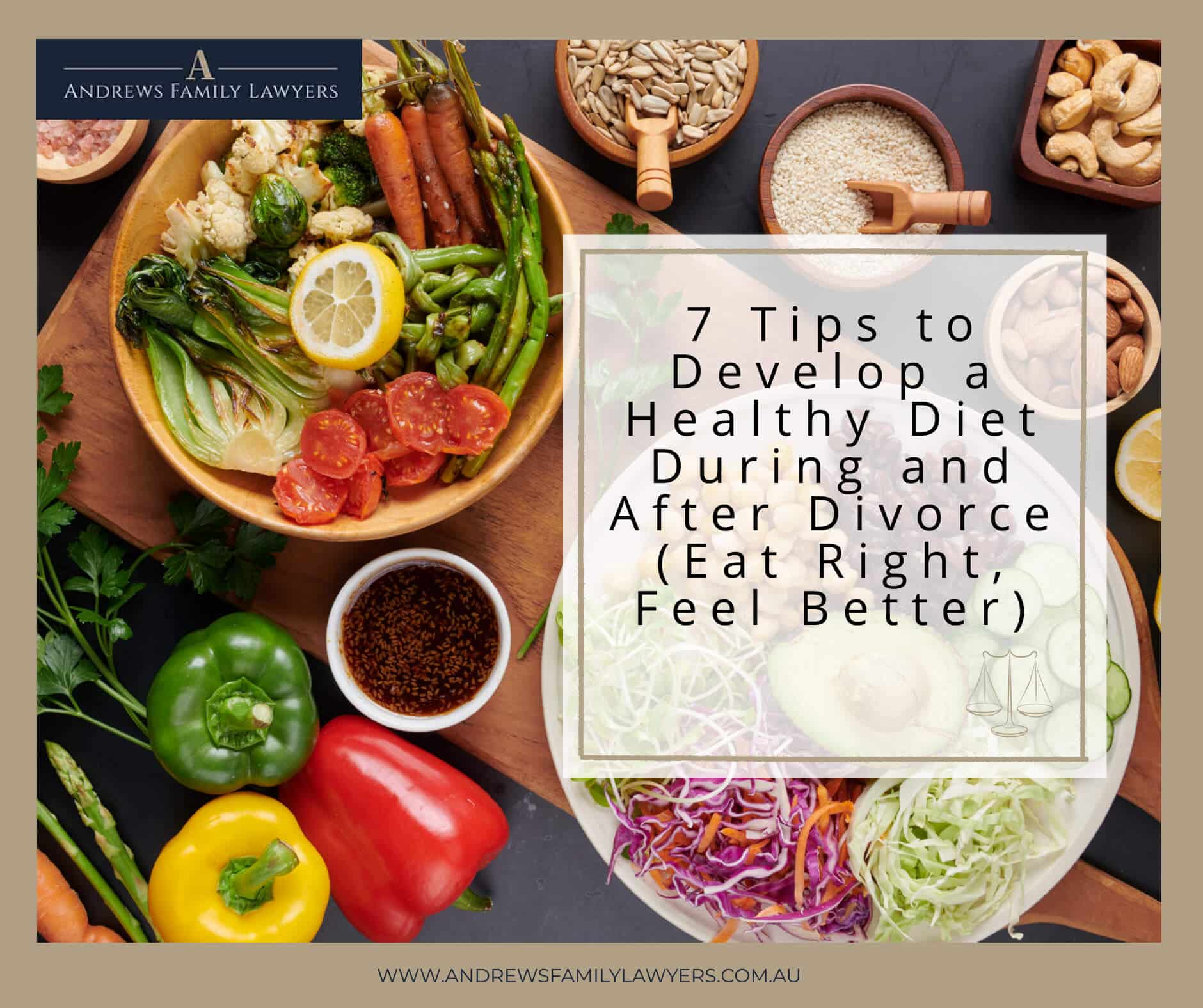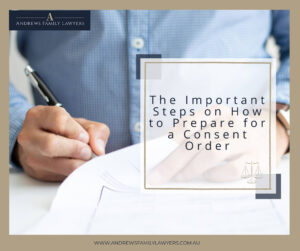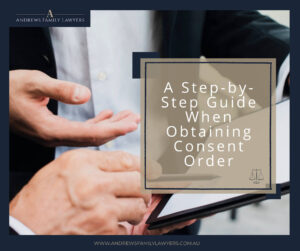We all understand our diet impacts our physical health. Bad diets can lead to serious outcomes like developing heart disease. However, it can also profoundly affect our mental and emotional well-being. Protecting all these aspects is crucial during stressful times like a divorce, making a healthy diet essential.
This article will cover 7 tips to help you manage your diet and encourage healthy eating.
Key takeaways
Professional assistance can help you approach your diet appropriately and realistically.
Maintaining a balanced diet benefits from nutritional understanding and a meal plan.
Routine meals help provide structure, help with sleeping patterns, and help with managing weight.
Target whole foods and opt for healthy snacking options.
Try cooking at home with simple recipes and healthy options in the pantry.
Control portions with smaller plates and keep a diary to track your eating patterns.
Listen to your hunger cues and exercise compassion for yourself.
7 Tips to Help You Manage Your Eating Habits and Promote a Healthy Diet
1. Seek Professional Guidance

Professional advice can help craft a healthy diet during and after a divorce. You can receive tailored guidance, support, and strategies to navigate challenging periods. Here’s how to effectively use professional advice for your dietary planning.
Consult a Registered Dietitian or Nutritionist
These professionals can offer personalised dietary advice based on your needs, preferences, and lifestyle. They can help you develop a balanced diet. They can also suggest meal plans so you eat fewer calories and provide strategies to deal with emotional eating or other challenges you might face during this time.
Set Realistic Goals
Work with the professional to set achievable dietary goals. These should be specific, measurable, attainable, relevant, and time-bound (SMART). Gradual changes work better than drastic alterations. The idea is to create long-term sustainability rather than short-term improvements.
Follow-up and Adjustments
Regular follow-ups with the professional can help you stay on track and make necessary adjustments to your diet plan. Your needs or circumstances may change, and your diet can be modified accordingly. For example, you may experience a change in your employment. This could affect your eating times or ability to afford certain foods.
You can find a professional dietitian in Australia here.
2. Maintain a Balanced Diet

Maintaining a balanced diet during and after a divorce involves a holistic approach. Addressing your nutritional needs while considering the emotional and lifestyle changes accompanying major transitions is helpful. Here are some things to consider when maintaining a balanced diet during this period.
Understand Nutritional Needs
A balanced diet should include a variety of healthy foods from all the major food groups. Find ways to incorporate fruits, vegetables, grains, protein sources, and dairy or alternatives. Each group provides essential nutrients that your body needs to function.
Monitor Your Progress
Keep track of your eating habits. Consider how you feel physically and emotionally and any changes in your weight or health. This can help you identify patterns and make adjustments as needed.
Plan Your Meals
Planning meals can help you consume nutrients and prevent last-minute unhealthy food choices. If you’re pressed for time, you may succumb to the temptation of consuming packaged and processed foods. While these are convenient, they’re not beneficial long-term. Create a weekly meal plan that includes balanced meals and snacks.
3. Routine Meals

Having your meals in a defined routine during and after a divorce benefits your physical and emotional well-being. Here’s how a structured meal routine can help.
Provides Structure
During significant change and uncertainty, having a set meal routine can provide a sense of normality. It offers a predictable and controllable aspect of your day, which can be comforting. It’s also one less thing to worry about.
Promotes Better Sleep
Eating regular meals can also help regulate your sleep cycle. Meals can affect our biology. For example, having a set dinner time can signal your body that it’s time to wind down for the night, promoting better sleep quality.
Supports Weight Management
Regular meal times can help with weight management by preventing overeating or snacking on unhealthy foods. You may be less likely to overindulge when you know your next meal or snack arrives at a set time.
4. Limit Processed Foods

Avoiding processed foods is a key step in developing a healthy diet. This is particularly vital during or after a divorce when maintaining your physical and emotional well-being. Here are strategies to help you minimise processed foods and embrace a healthier diet.
Shop the Perimeter
It’s good to get to know your local grocery store. In most grocery stores, the perimeter is where you’ll find fresh fruit and vegetables, lean meats, and dairy products. The aisles tend to contain more processed items. Focus your shopping around the perimeter.
Choose Whole Foods
Target whole, minimally processed foods like fruits, vegetables, whole grains, lean proteins, and nuts. These foods are more nutrient-dense and less likely to contain unhealthy additives. You can reduce salt intake and add more healthy fats to your diet.
Healthy Snacking
Replace processed snacks with healthier alternatives, such as fruits and fruit juice, nuts, seeds, yogurt, or homemade granola bars. Having these healthy options readily available can prevent you from reaching for processed snacks.
5. Cook at Home

Cooking at home is a powerful strategy for developing a healthy diet during or after a divorce. It gives you control over ingredients, helps you avoid processed foods, and can be therapeutic. Here’s how to leverage home cooking for a healthier diet.
Start with Simple Recipes
If you’re not accustomed to cooking, begin with simple, straightforward recipes that require few ingredients. Many online resources, cookbooks, and cooking shows are aimed at beginners. As you increase in confidence, you can try more complex and interesting recipes.
Use Healthy Cooking Methods
Use cooking methods that retain nutrients and minimise unhealthy saturated fats. Try grilling, baking, steaming, or stir-frying rather than deep-frying.
Stock a Healthy Pantry
Keep your pantry and fridge stocked with healthy staples like whole grains, legumes, canned tomatoes, spices, and frozen vegetables. These items make it easier to throw together a nutritious meal.
6. Portion Control

Portion control is a crucial aspect of maintaining a healthy diet. When you’re experiencing stress and emotional upheaval, you can give in to overeating or undereating. Here’s how to effectively control food portions.
Use Smaller Plates
Smaller plates can help trick your brain into feeling satisfied with less food. This simple change can significantly affect the food you consume at each meal.
Don’t Skip Meals
Skipping meals can lead to overeating later. Regular, balanced meals can help maintain energy intake and prevent hunger-induced overeating. This can help you sustain a healthy weight.
Keep a Food Diary
Tracking what you eat can increase your awareness of portion sizes and eating patterns, which can help you make adjustments where necessary.
7. Listen to your body

Listening to your body is crucial for developing a healthy diet. Everyone’s body reacts differently to stress, and the impact of eating habits and physical health also varies. Here’s how to tune into your body’s signals to nurture your well-being.
Identify Hunger and Fullness Cues
Learn to differentiate between physical hunger and emotional hunger. Physical hunger builds gradually and is satisfied when you eat. Emotional hunger is sudden and not satisfied by eating. Stop eating when you’re comfortably full, not stuffed.
Be Patient and Kind to Yourself
Developing a deep understanding of your body’s cues is a process that takes time. You don’t have to get things right immediately. Practice self-compassion and recognise that it’s a journey of learning and adapting.
Recognise Emotional Eating
Be aware of patterns where you might use food to cope with emotions. If you reach for food when you’re not physically hungry, try to identify the emotion and address it more constructively. A dietitian can help you make these connections.
Conclusion
During a divorce, you can experience many stresses, which can significantly impact your mental and emotional health. Poor dietary patterns can amplify the effects of stressful situations.
These 7 tips aim to help you craft healthy meals. This will help you control your nutrition and live a happier and healthier future.
If you need assistance with family law matters, Andrews Family Lawyers can help.




